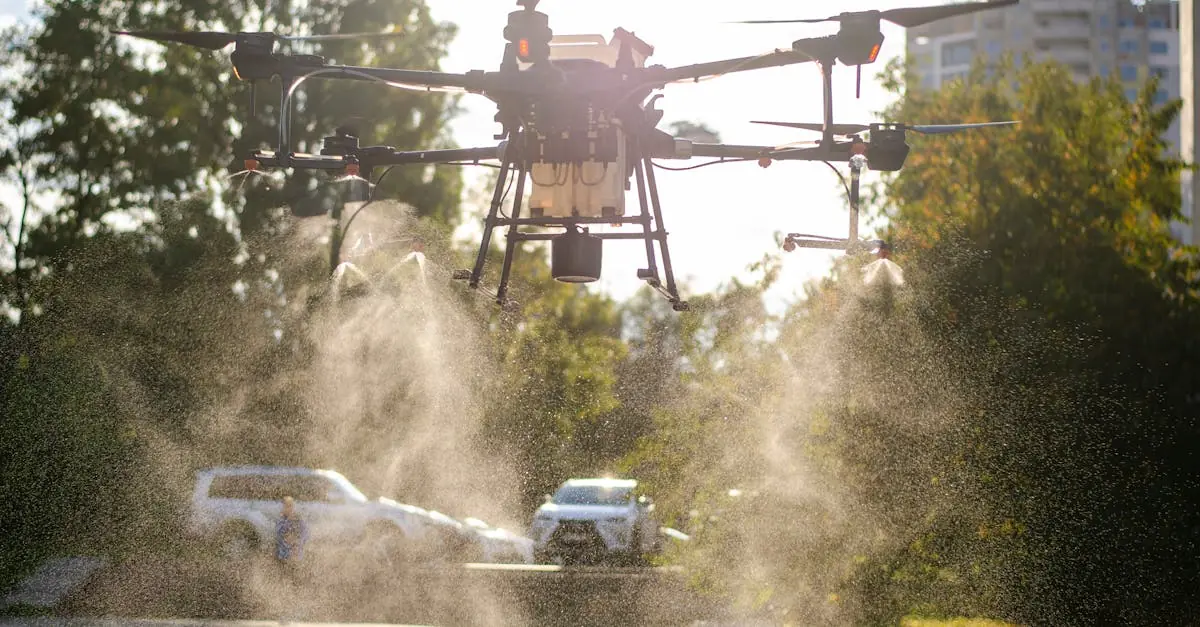Table of Contents
ToggleImagine a world where traffic jams are just a distant memory and your morning commute feels more like a scene from a sci-fi movie. The future of transportation is gearing up to be nothing short of revolutionary, with technology poised to transform how we travel. From flying cars to hyperloop systems, the possibilities are as exciting as they are mind-boggling.
Future Technology In Transportation
Transportation technology will revolutionize how people and goods move. Innovations like flying cars, once a staple of science fiction, now enter the realm of possibility. Companies like Terrafugia and PAL-V aim to deliver flying vehicles by 2025, potentially reducing travel times dramatically.
Hyperloop systems, another groundbreaking development, promise to transport passengers at speeds exceeding 700 miles per hour. This high-speed mode of transit could connect urban centers, cutting down on traditional rail and flight times. Virgin Hyperloop completed successful tests, showing significant potential for this technology.
Autonomous vehicles are set to reshape roads in the near future. Major manufacturers, including Tesla and Waymo, are already testing self-driving cars. These vehicles aim to improve safety by reducing human error, which accounts for approximately 94% of traffic accidents, according to the National Highway Traffic Safety Administration.
Electric mobility is also gaining traction. The push for electric vehicles (EVs) focuses on reducing carbon emissions and dependence on fossil fuels. By 2030, analysts predict that EVs could make up over 50% of new vehicle sales in the U.S., accelerating the transition to sustainable transportation.
Drones are emerging as efficient solutions for deliveries, allowing companies like Amazon and Google to optimize logistics. These aerial vehicles can navigate urban landscapes and rural areas alike, increasing delivery speed and reducing congestion caused by traditional delivery vehicles.
Emerging transportation technologies foster a more seamless experience and create smarter cities. Integration of apps and smart infrastructure enables real-time data sharing, ensuring more efficient routing and traffic management. Eventually, the collaboration between humans and technology will redefine the way society approaches travel and logistics.
Emerging Technologies
Emerging technologies are shaping the future of transportation, creating a path to more efficient and sustainable travel.
Electric Vehicles
Electric vehicles (EVs) play a crucial role in reducing carbon emissions. Projections indicate that EVs could make up over 50% of new vehicle sales in the U.S. by 2030. Major manufacturers are committing to EV production, and advancements in battery technology are enhancing performance and range. Charging infrastructure expands rapidly, making EV ownership more viable. By adopting EVs, cities can improve air quality and reduce noise pollution. Companies like Tesla and Rivian lead the charge to revolutionize personal and commercial transportation.
Autonomous Vehicles
Autonomous vehicles are redefining road safety and convenience. Major manufacturers like Tesla and Waymo have conducted extensive testing, aiming to minimize human error. Research indicates that human involvement accounts for approximately 94% of traffic accidents. With the introduction of fully autonomous systems, the potential for fewer accidents becomes realistic. Moreover, these vehicles can enhance traffic flow and decrease congestion. As regulations adapt, widespread adoption of autonomous technology is likely to reshape urban mobility, offering safer and smarter travel solutions.
Smart Infrastructure
Smart infrastructure integrates technology into transportation systems to enhance efficiency and safety. This approach transforms the way cities manage traffic and transportation networks.
Intelligent Transportation Systems
Intelligent Transportation Systems (ITS) leverage advanced technologies to improve traffic flow and enhance safety. These systems utilize real-time data to provide drivers with timely information on traffic conditions, accidents, and weather. Real-time monitoring of traffic signals and vehicle movements allows for optimized signal timings, reducing congestion. Studies indicate that implementing ITS can boost traffic efficiency by up to 30%. Governments invest heavily in ITS solutions to facilitate smoother commutes and lower accident rates, prioritizing safety and reliability in urban travel.
Connected Roadways
Connected roadways create a network of communication between vehicles and infrastructure. This technology enables vehicles to share data about their surroundings, enhancing situational awareness for drivers. Vehicles equipped with Vehicle-to-Everything (V2X) communication can receive alerts about upcoming hazards, reducing the likelihood of collisions. Moreover, connected roadways allow cities to monitor and manage traffic in real-time, dynamically adjusting signals based on traffic patterns. Analysts predict that connected infrastructure could decrease traffic fatalities by 20%. Investment in this technology is crucial for building safer, smarter urban environments.
Sustainability Innovations
Sustainability innovations in transportation focus on reducing environmental impact while enhancing efficiency. Companies are increasingly embracing renewable energy sources to power vehicles and infrastructure.
Renewable Energy Solutions
Solar energy plays a crucial role in powering electric vehicles and charging stations. Wind energy complements these solutions by providing clean electricity for transportation needs. Research indicates that adopting renewable energy can cut transportation-related carbon emissions significantly. Investments in infrastructure to support these energy sources enhance their viability. Public transportation systems are progressively integrating solar panels, promoting energy independence. Many cities are exploring incentives to encourage the adoption of electric buses powered by renewable sources.
Eco-Friendly Materials
Innovations in eco-friendly materials are transforming vehicle manufacturing. Manufacturers increasingly utilize recycled materials to reduce waste and energy consumption. Biodegradable composites are replacing traditional plastics in various vehicle components. Studies show that utilizing sustainable materials can decrease greenhouse gas emissions in production by up to 30%. Companies are prioritizing lightweight materials, which enhance fuel efficiency. Advancements in sustainable manufacturing processes are also gaining traction, aiming to minimize environmental impact. The shift towards recycling and sustainability reflects a broader commitment to protecting the planet.
The Role of AI and Big Data
AI and big data play critical roles in the evolution of transportation. Their integration leads to smarter solutions and improved efficiency across various systems.
Predictive Analytics
Predictive analytics harnesses historical data to forecast future trends in transportation. By analyzing patterns in traffic and travel behavior, it identifies peak congestion times and potential bottlenecks. Companies utilize these insights to optimize routes and reduce travel times. For instance, airlines employ predictive analytics to adjust flight schedules based on expected passenger demand. Research shows that using predictive models can enhance operational efficiency by 15%, offering substantial cost savings for businesses and improving travel experiences for customers.
Traffic Management Solutions
Traffic management solutions leverage AI and big data to improve urban mobility. Intelligent Transportation Systems (ITS) analyze real-time traffic data, enabling quick responses to incidents and congestion. Innovations like adaptive traffic signals adjust light timings based on current traffic flow, reducing wait times. Authorities implementing these systems report a 30% increase in traffic efficiency. Additionally, integration with connected vehicles fosters a data-sharing ecosystem. This allows vehicles to communicate with traffic signals and each other, further enhancing safety and reducing accidents.
The future of transportation is poised for remarkable change driven by innovative technologies. As flying cars and hyperloop systems become more than just concepts, they promise to redefine how people travel. The rise of electric vehicles and autonomous systems will not only enhance efficiency but also contribute to a cleaner environment.
Smart infrastructure and connected roadways will further optimize urban mobility, making travel safer and more efficient. The integration of AI and big data will enable real-time solutions that improve traffic management. As sustainability becomes a priority, the transportation industry is embracing eco-friendly practices that protect the planet.
With these advancements on the horizon, the landscape of transportation will evolve into a more exciting and sustainable future, transforming everyday commutes into extraordinary experiences.





